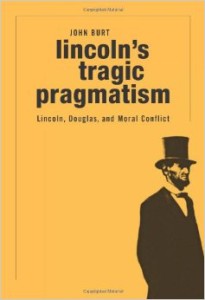John Burt. Lincoln’s Tragic Pragmatism: Lincoln, Douglas, and Moral Conflict. (Cambridge, Mass: Belknap Press of Harvard University Press, 2013) 836 pages.
Review by Peter Wirzbicki
Few modern academics, and fewer historians, can smoothly glide between Rawls, Kant, Hegel, and obscure details of the Freeport Doctrine with such ease as John Burt in Lincoln’s Tragic Pragmatism. Fewer still can make such details of political history seem to matter to the high philosophical tradition. It treats Abraham Lincoln and Stephen Douglas not just as political figures, but as intellectuals whose approaches to democratic life reveal something profound about the nature of moral commitment itself. Lincoln’s Tragic Pragmatism is an excellent addition to the scholarship on Lincoln and an important work of social theory in its own right.
Burt is interested in the specific question of how America could survive the tension between the moral crime that was slavery and the democratic belief that even slaveholders and their supporters were part of a political community whose opinions were all equally worthy of consideration. The slavery debate raised an ethical quandary that lies at the heart of democracy: how can we maintain our belief in the equality of all citizens who are free to develop their own answers to moral problems and yet at the same time remain dedicated to some sort of foundational and shared moral ideals (starting with equality itself)?
Burt has a surprisingly positive view of Stephen Douglas—the Little Giant who has had such a small reputation in recent historiography—and one of the book’s strengths is its refusal to simply write-off Douglas’s approach to the problem. The Illinois Senator, Burt admits, was both eager to race-bait Lincoln and happily complicit in the silencing of abolitionists. But there was a sincere moral position to Douglas’s embrace of popular  sovereignty. Douglas saw majority rule as the only legitimate way to answer political problems and feared—presciently perhaps—that if people aren’t willing to compromise their moral positions they are headed towards violent war. There is a certain democratic humility to Douglas that Burt respects, a “reasonableness,” and willingness to allow everyone their own political and moral judgment, to try to manage disagreements with “modus vivendi” solutions that keep the endless process of democratic deliberation and discussion alive. In normal times, democracies need Douglases, Burt suggests, as “dealmakers” to balance competing interests and craft compromises. Of course, as he admits, such a position runs the risk of degenerating into “naked expediency,” into a politics devoid of any moral order at all.
sovereignty. Douglas saw majority rule as the only legitimate way to answer political problems and feared—presciently perhaps—that if people aren’t willing to compromise their moral positions they are headed towards violent war. There is a certain democratic humility to Douglas that Burt respects, a “reasonableness,” and willingness to allow everyone their own political and moral judgment, to try to manage disagreements with “modus vivendi” solutions that keep the endless process of democratic deliberation and discussion alive. In normal times, democracies need Douglases, Burt suggests, as “dealmakers” to balance competing interests and craft compromises. Of course, as he admits, such a position runs the risk of degenerating into “naked expediency,” into a politics devoid of any moral order at all.
And antebellum politics, of course, were anything but normal times. In the clash between democratic tolerance and moral righteousness there is a certain moment at which citizens must draw the line, refusing to accept the moral judgments of immoral neighbors, and when Douglas’s deal-making ethos fails us. “Tragic Pragmatism,” then, denotes Lincoln’s uneasy embrace of moral politics, his belief that politics must be rooted in some moral norms that cannot be dealt away. Burt explicitly compares Lincoln to another Abraham—Kierkegaard’s trembling hero who, unsure of the ultimate grounds of his belief, nonetheless devotes himself to an action he cannot fully comprehend. This is Burt’s “irony of history”: politics involves “moral wagers whose wisdom cannot be clear when they are made,” wagers like Lincoln’s rejection of the Crittenden Compromises or his embrace of emancipation (92). Like Israel’s Abraham, we all make moral leaps of faith every day, believing propositions that we cannot defend in some final manner and of which we do not understand the full consequences. But we don’t all have the wisdom of Illinois’ Abraham, aware that since our moral commitments involve some level of choice, we must always maintain the possibility of reconciliation with our opponents, whom we understand to have a “common fallenness” (649) with ourselves.
Hanging over Lincoln’s Tragic Pragmatism is the specter of another great work of historical political theory that took the Lincoln-Douglas debates for its muse—Harry Jaffa’s 1959 classic Crisis of the House Divided. For Jaffa, Lincoln is a confident Platonist, a man sure of the solid foundation of natural law that underpinned the American project, and which was threatened by Douglas’ amoral embrace of popular sovereignty. Burt’s Lincoln is less self-righteous and more ambivalent than Jaffa’s, less a figure exemplifying the neoconservative dream of a stable moral order and more an anguished man groping slowly towards a goal he doesn’t quite understand he has, a politician who successfully but precariously remains both a democrat and a man of principle.
Like Jaffa and many other historians, Burt emphasizes the influence of the Founders on Lincoln’s political vision. Thus Lincoln did have one resource to draw on in deciding when to make moral gambles: the promises of equality made (but not fulfilled) by the Founders. For Burt, Lincoln practiced “Reserve Burkeanism.” Rather than repeat the actions of the Founders, we should be ashamed when we cannot uphold the “promises they knew they could not keep but made anyway.” (4) In a sense, we should do as Jefferson said, not as he did. Ideas—both of the Founder’s and of Lincoln himself—tend to have a life of their own for Burt; our abstract political conceptions always contain the possibility of taking on multiple forms when adopted in the world.
One of Burt’s formulations that intellectual historians might be most interested in is this notion of “implicitness,” the notion that our ideas have a depth that is greater than their formal formulation might imply. We don’t always see how one moral commitment (the Declaration of Independence’s promise of equality, for instance) might contain within it the seeds of a new moral commitment (emancipation) that will only unfold over time. Attempting to answer one of the great questions in Lincolnology—discerning the Great Emancipator’s attitudes towards race—Burt argues that without necessarily consciously willing racial equality, as early as the 1850s Lincoln had committed himself to certain conceptions of political equality that implicitly contained racial equality. Under the pressure of a war he couldn’t fully control, these conceptions bound him to a view of America that mandated emancipation, suffrage, and racial equality.
It is a shame that Burt spends such little time on the third group: those whose “apodictic styles” were a central part of the antebellum landscape. Dismissing them can edge Burt uncomfortably close to the “tragic generation” thesis that the Civil War was a result of irresponsible politicians, not irreconcilable economic and political interests. Slaveholders appear with their opinions largely preformed, their fire already eaten. Northern thinkers—from Frederick Douglass to Ralph Waldo Emerson—who saw resistance to slavery to involve dedication to moral higher laws, exhibit “moral narcissism” and appear largely as foils to the tragic and responsible Lincoln (25). Unlike Eric Foner or James Oakes, Burt largely ignores Lincoln’s many interactions with more marginalized figures, such as abolitionists and black intellectuals. One can forget that the style of tragic liberalism that Burt celebrates is forged by political elites, who have a very specific task of mobilizing and holding together diverse political constituencies rather than activists whose task is to create a constituency devoted to a moral truth, and for whom a certain clarity is a valuable, even pragmatic means to mobilize the powerless.
Lincoln’s Tragic Pragmatism is a remarkable amalgamation of history, normative political theory, literary and rhetorical analysis, and presidential biography. It engages with fundamental questions of the human experience while staying tied to a rigorous study of the rhetoric and background of two historical thinkers—Abraham Lincoln and Stephen Douglas. Intellectual historians could learn from Burt’s willingness to derive such urgent moral and philosophical questions from our study of the past.
Peter Wirzbicki (Ph.D. New York University) is a Collegiate Assistant Professor and member of the Harper Society of Fellows in the Liberal Arts at the University of Chicago.  His book manuscript entitled “Following the Higher Law: Black and White Transcendentalism and the Fight against Slavery,” explores the relationship between Transcendentalism, abolitionism, and black intellectuals in antebellum New England. He can be reached at [email protected]
His book manuscript entitled “Following the Higher Law: Black and White Transcendentalism and the Fight against Slavery,” explores the relationship between Transcendentalism, abolitionism, and black intellectuals in antebellum New England. He can be reached at [email protected]

0